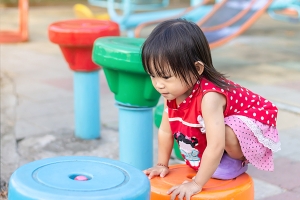
Anyone with multiple children (or their own siblings) knows that sibling squabbles are a normal part of childhood. Even so, any type of ongoing or escalated family conflict wears parents down. It may not be possible to end all disagreements, but there are tried-and-true techniques to foster more peaceful, loving relationships among siblings.
To compile helpful tips, we sought advice from several sources: Lindsay MacMaster, PsyD, a clinical psychologist who works with children, adults and families in San Diego; the American Academy of Pediatrics (AAP); a local mom of nine kids; and Love and Logic, a research-driven approach to developing healthy relationships. Here’s what the experts say:
SPEND QUALITY TIME WITH EACH INDIVIDUAL CHILD. Children often fight to gain the attention of parents. (Have you noticed how kids act up the moment you get on the phone? Case in point.) According to Love and Logic, having healthy relationships between parents and kids is a key element in resolving sibling rivalry.
To improve parent-child relationships, try scheduling regular, focused one-on-one time with each child (let kids choose the activity). Even 15 minutes a day allows you to run around the backyard, play a quick game of cards or share a sweet treat together.
Read more about this topic in our article Parenting with Purpose: Why Parent/Child Dates Are So Important.
DON’T COMPARE YOUR KIDS. Every child has strengths and weaknesses. To discourage competition, avoid comparing siblings to each other, as tempting as it might be. Instead, focus on (and celebrate) each child’s individual interests and attributes. The AAP states it perfectly: Each child is special; Let each one know.
HOLD FAMILY MEETINGS. Facilitate open communication about family expectations, goals and accomplishments to help prevent sibling conflict. The AAP recommends holding weekly family meetings. Limit these to 20–30 minutes and keep the tone positive. Allow each family member the opportunity to speak without interruption. Family meetings not only give kids an individual voice, they also reinforce the team nature of family.
PRAISE GOOD BEHAVIOR. When your kids play together cooperatively, be sure to praise the behavior. Let them know how happy it makes you to see such strong sibling bonding.
It’s also important to recognize any attempts to resolve conflicts on their own. Encouraging siblings to work things out before running to a parent will ultimately preserve your own sanity—even if you sometimes need to step in.
TAKE A MOMENT BEFORE INTERVENING. Although it’s tempting to yell, jump in as referee, or send kids to their rooms when an argument breaks out, take a moment (and a few deep breaths) before intervening. Your initial response impacts resolution and outcome.
“As parents, [parents] set the tone of adding to any present tension or bringing self-regulation to the moment,” says MacMaster. Aim to keep your voice level and emotions in check.
Consider whether parental intervention is actually necessary. “Not all conflict requires parental intervention,” says Shannon Mizel, a local mother of nine. “Sometimes kids benefit from resolving their own conflicts as we serve as a guide on the side.”
Mizel suggests that some conflicts are not worth the energy. “Every conflict should not become a crisis,” she says. With guidance, kids can learn the differences between trivial matters and those worthy of discussion.
AVOID TAKING SIDES. At times, it may be clear that one of your children is in the wrong, but taking such a stance in the heat of the moment isn’t going to help. While this may seem counterintuitive, MacMaster explains that letting go of logic and reasoning while “big feelings” are involved is a more effective way to decrease defensiveness and work towards resolution.
VALIDATE EMOTIONS. When sibling conflict requires parent involvement, start by providing validation for each child’s emotions. This may be as simple as saying, “It must be hard to be so frustrated with each other” or “I understand that you’re really upset with your sister.” MacMaster explains how validation can slow down tense sibling moments, decrease defensiveness and create a safe space for sharing.
GUIDE SIBLINGS TO LISTEN TO EACH OTHER. “Ask each child to share their experience while everyone else listens and then have the other child share,” suggests MacMaster. Listening to each other is an important step towards kids developing skills to resolve conflict on their own.
Mizel explains how she and her husband have encouraged their kids to “be more sensitive and less sensitive,” meaning to be more in tune with the needs and feelings of siblings, while less easily offended themselves.
ENCOURAGE COLLABORATION. MacMaster recommends parents show openness and curiosity with statements like, “I wonder if you both have ideas of how to figure this out.” It takes pressure off parents creating solutions and builds problem-solving skills in children. It’s completely fine if kids come up with something different than parents would have.
For more information on encouraging peace with siblings, MacMaster recommends the “Peace and Parenting” podcast by Michelle Kenney, M.Ed. If you require additional support, consider family counseling to work on specific challenges within your household.
Lisa Pawlak is an award-winning contributing writer who lives in Encinitas with her family.















